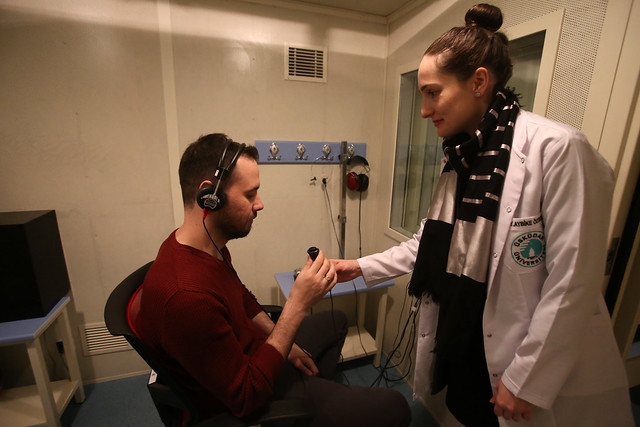What is Audiometry Program?
Audiometry program is an associate degree program established to train professional staff to assist in the diagnosis of hearing and balance disorders.
The aim of Üsküdar University Audiometry Program is to train qualified audiometry technicians who know and use scientific methods in the diagnosis of diseases that cause hearing loss and balance disorders, apply hearing and balance tests, assist patients in the use of hearing aids prescribed by ENT specialist physicians, follow current developments in the field, continuously improve themselves by taking advantage of various opportunities, have verbal communication skills and the ability to apply new technological developments competently.

What are the Duties, Authorities and Responsibilities of Graduates of Audiometry Program?
- Performs pure tone and speech audiometry and other audiologic examinations using the necessary equipment for clinical evaluation of patients. Records the type and level of hearing loss obtained according to the results of these tests and the opinions about the patient's cooperation on the test form.
- Performs pediatric audiometry, vestibular tests, otoacoustic emission applications and other electrophysiological tests under the supervision of the relevant specialist when necessary.
- Performs audiometric tests in hearing screening programs and keeps records.
- Performs environmental and workplace noise measurement using various measurement tools.
- Takes ear mold measurements for hearing aid application, measures and adjusts the gain and output values of the devices deemed appropriate.
- Ensures the maintenance, repair and calibration of the equipment used.
- Provides the necessary information to the patient and/or the patient's relatives about the procedures to be performed and test results.
What are the courses in the Audiometry Program?
In the Audiometry Program, which provides education as normal and second education; In the first and second semesters, there are distance education courses as well as department and basic health courses. In the first semester; Atatürk's Principles and History of Revolution I, Turkish Language I, English I courses are taught as distance education; Hearing and Measurement I, Occupational Technology, Basic Anatomy and Physiology, Biophysics, Physics of Sound, University Culture I, and Positive Psychology and Communication Skills courses. In the second semester; Ataturk's Principles and History of Turkish Revolution II, Turkish Language II, English II distance education courses and Hearing and Measurement II, Hearing Losses, Interview Techniques in Audiometry, Basic Medical and Biological Sciences, University Culture II, Introduction to Medical Biology and Genetics and Occupational Technology courses are given.
In the third and fourth semesters; department courses and field applications are more weighted. In the third semester; Vestibular System and Evaluation Methods, Clinical Practice I, Hearing Aid and Application Principles, Sign Language I and Electrophysiological Test Methods, Professional Ethics and Health Law courses are given. In the fourth semester; Clinical Practice II, Audiological Evaluation with Cases, Hearing Screenings, Research Methods and Techniques in Audiometry, Sign Language II and First Aid courses are given. In addition to these theoretical and practical courses, students do a 20-day compulsory summer internship at the end of the 1st or 2nd year.
What are the Working Areas of Audiometry Program Graduates?
Graduates of the program can work in audiology clinics of state, university or private hospitals, audiological diagnostic centers and hearing aid companies under the supervision and supervision of audiologists or ENT diseases specialist. They can apply hearing tests to newborn babies in maternity clinics and conduct hearing screening tests in schools. They can also take part in noise measurements and hearing screenings in industry.

You can transfer to an undergraduate program with DGS
Students who graduate from the Audiometry program; By being successful in the Vertical Transfer Examination (DGS), they can continue their undergraduate programs in Audiology, Speech and Language Therapy, Special Education Teaching, Physics, Physics Engineering, Optical and Acoustic Engineering.
